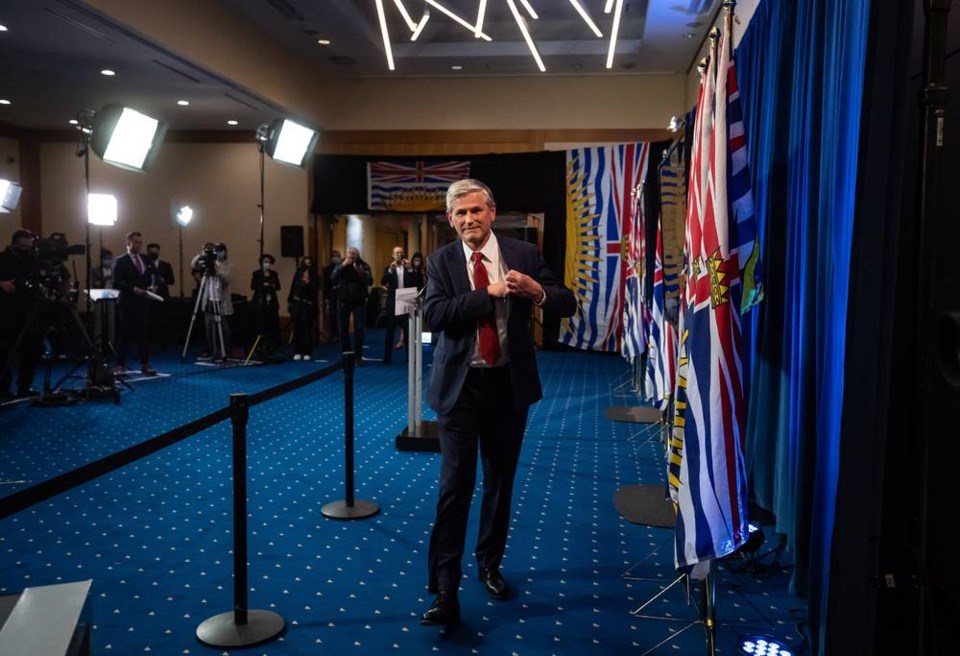B.C.’s last general election in 2017 took 69 days to figure out, but Saturday’s vote was more decisive even if the final count will take a few more weeks.
Langford’s John Horgan is the first NDP premier to serve two terms, and will start his second term in a much stronger position with a majority government.
No more regular meetings with the B.C. Green caucus to cautiously run any and all ideas past them before implementation. No more million-dollar-a-year secretariat to keep the New Democrats and Greens on the same page.
Paradoxically, the Greens look to have almost held their share of the vote and a handful of seats — mostly through leader Sonia Furstenau’s personal campaign — but lost all the power they held by way of the confidence agreement.
And the B.C. Liberals, down about 14 seats from their 2017 hold, will likely start their second big round of questioning about leadership. Former Liberal premier Christy Clark started the first one in 2017 by quitting. The second will arise courtesy of current leader Andrew Wilkinson — whether he wants it or not — through his dismal failure at connecting with voters.
He could stay on and try again as his mentor Gordon Campbell did after 1995. But it won’t be before a lot of second-guessing by disappointed members. Trivia point to remember: It took him five rounds of voting to win the party leadership three years ago.
Waiting for a mail-in miracle on Saturday, he opted not to concede — like Al Gore did disastrously in the 2000 U.S. presidential contest.
“We owe it to every voter to await the final results.”
Although the seat count makes for a dramatic change in the landscape, all it took was a four percentage point swing in the popular vote.
The NDP gained about that much from 2017 and the Liberals dropped about the same amount, based on partial results.
The COVID-19 pandemic, which has dominated the provincial consciousness and the economy for most of the year, also dictated the results. Even though the pandemic is accelerating in B.C., voters endorsed the government’s impressive response to the crisis, and opted not to change leaders while case counts soar.
The 2017 delay arose from the dead-heat election that prompted weeks of dickering that led to the collapse of the B.C. Liberal government and the NDP-Green confidence deal.
This time around the delay will arise from hand-counting hundreds of thousands of mailed-in ballots.
Horgan will spend it bracing for a major decision that’s looming about the problematic Site C dam clean energy project on the Peace River.
An independent review will land on his desk about a geological fault that was only recently discovered, despite the decades of study that went into the project.
When Horgan decided in December 2017 to proceed with the Liberal-inspired project – after an earlier review – it was one of his most dismal public appearances.
He was “heavy-hearted” filled with regret and openly-dismayed at being forced to accept the massive project was past the point of no return.
His next big call could set the tone for his relationships with the environmental wing of his party.
Election 2020 is the second province-wide public vote in two years that the NDP has adjusted the democratic process to suit their own purposes.
During the referendum on proportional representation, the NDP refused to let a neutral body oversee the process, pretended a partisan cabinet minister was a “neutral arbiter,” adjusted the approval threshold to suit their preferences and changed the rules in mid-stream for their own purposes.
This time around Horgan violated the spirit of the law stipulating a fixed date for a vote and reneged on a signed agreement with the Greens not to hold an early election.
He opened the campaign with an assortment of excuses for breaking his word and still won.
For all the perennial complaints about politicians who don’t hold to principles, this example didn’t bother people in the slightest. Likely there was too much on people’s minds for that to fester.
But when it comes to letting people decide democratically, the NDP need to be watched carefully. They have established a tendency to put their thumb on the scales.
lleyne@timescolonist.com



